How to Get High Quality Backlinks Without Guest Posting
-

Aaron Gray
- Blogs
-
 December 19 , 2022
December 19 , 2022 -
 9 min read
9 min read
There’s a saying that writers love citing: ‘Anyone can write, but not everyone can be a writer.’ Like any other talent, writing requires time, dedication, and – in one writer’s words – crippling self-doubt.
Unfortunately, writing is as common in modern SEO as sand is in the desert. Over the years, search engines have required websites to create quality content to rank above the competition. Whether blogs or infographics, great writing can lead to SEO-friendly content.
Because time is a luxury for businesses, as we’ll learn later, they often leave content generation to professional writers like guest bloggers. But what if that isn’t an option? Is it even possible to get quality backlinks without guest posting, let alone rank high on results pages?
What To Know About Guest Posting

We’ve discussed guest blogging a couple of times, from the basics to guidelines. The long and short of it is that guest blogging involves publishing an article or blog post on a website other than your own. Need blog posts about technical topics without appearing too promotional? Need to sound unbiased and reputable? Guest blogging is an option.
These bloggers do more than just churn out articles. If the price is right, they’ll also think of what to write about and where to post them. Their services are tempting since you can leave producing content to them while focusing on running your business. So why wouldn’t anyone want them?
- Getting Results Takes Time
- Client-Blogger Relationship
- No Guarantee of Publication
The most common argument for not considering guest posting is that getting results takes time. It’s not like a website will magically see its rankings improve as soon as the post or blog goes live. That’s not how SEO works.
Still, this argument has the numbers to back it up, starting with the average time required to create a blog post. The latest data shows that the time – from research to composition – has nearly doubled over eight years.
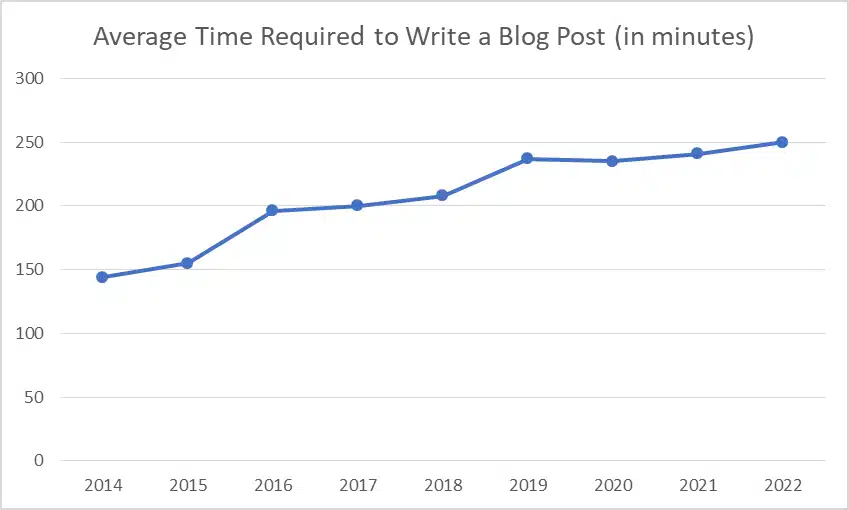
Whereas guest post creation is measured in hours and minutes, its effects on search results are measured in years. In this report by the Content Marketing Institute, SEO professionals say not to expect a significant return on investment in guest posting for the first two years. Consistent quality posting helps, but it isn’t a ‘get rich quick’ plan, as some believe.
Most guest bloggers are either freelancers or work for a content marketing company. Because of this, they can’t necessarily think the same way as the client businesses they serve. The post they produce might end up different from what the client has in mind.
The best approach to this issue is to be as specific about the order details as possible. Do you allow the blogger to have free rein over the content or want them to stick to a particular plan? Are there specific details you don’t want the writer to mention? Should they write for a niche or all readers in general? There are many factors to consider – perhaps one too many.
This arrangement can potentially be a headache when working with bloggers who republish their work on other sites, known as content syndication. For the record, it isn’t a black hat (it may even prove beneficial in some cases), but it creates duplicates that can confuse Google. It may end up ranking the syndicated post higher than the original.
Unlike writing for a business’ own blog page, guest posting can’t guarantee getting featured, no matter how well-thought-out a piece is. Figures for a website’s acceptance rate are hard to come by, but some professionals in the industry say 3% to 10% is in the ballpark. That means more than 90 out of 100 articles submitted don’t see the light of day.
Take those figures with a grain of salt, though. Almost everyone and their sister companies are doing guest posting, meaning publishers have to go through endless submissions, with some inevitably getting buried in their inboxes. As such, the actual rate can be much lower.
Even getting published has its fair share of risks. Guest posts can risk triggering Penguin, the part of Google’s algorithm that hunts down unnatural links. Your best bet in this situation is to create content not to get backlinks but provide helpful information to readers.

Alternatives to Guest Posting
Despite what we’ve explained just now, guest blogging remains one of the best ways of earning quality backlinks. If it isn’t an option for you, don’t panic. The modern SEO handbook has several alternatives worth trying.
- Publishing Original Research
- Hijacking A Broken Link
- Creating A Much Better Post
- Reaching Out To Reporters
If you’re a regular at the NO-BS Marketplace Blog, you may notice that we use plenty of external sources, namely from sites like Ahrefs and Hubspot. Of course, we give enough credit where it’s due, as responsible content should.
On that note, look at their respective backlink profiles.


It’s any website’s dream to get that many backlinks, let alone that exceptional Domain Rating (DR). One of the reasons for this impressive-looking profile is that these websites perform original research on their niche. It’s hard to resist compelling statistics, and because of this, other websites will be inspired to link the research in their respective content.
Doing original research is easier said than done, and running your business on top of it makes the task harder. Fortunately, a viable workaround involves asking researchers for their studies and producing summaries. Even if it isn’t necessarily your research, you’ll still get plenty of links as long as the content contains a link to the study.
This setup isn’t unusual, especially among SEO-related content. Blog pages and niche sites often gather statistics, including links to the original research, and put them in a listicle-style format. Below is an example from Ahrefs.
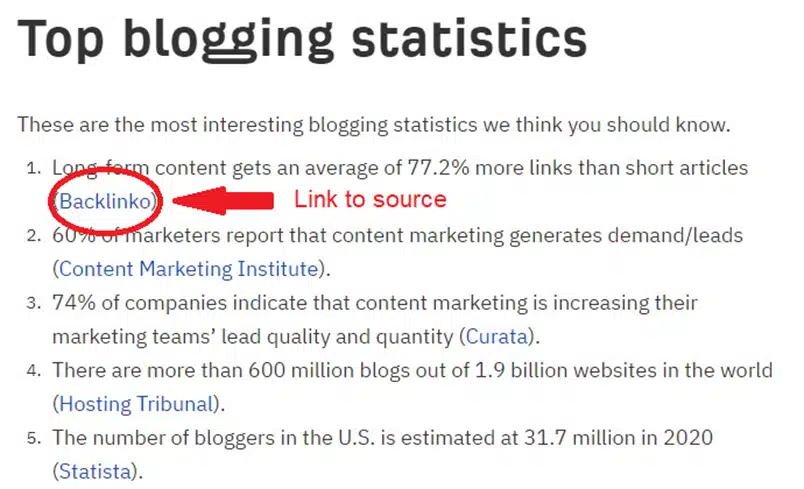
Imagine clicking a link in an article, then this happens:
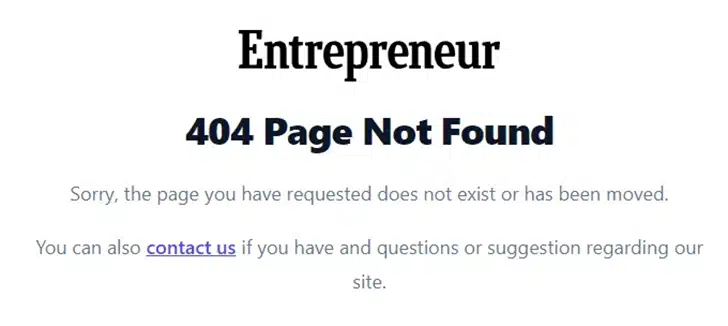
Sadly, this is inevitable in the constantly-changing World Wide Web. Pages get moved often, if not deleted, as websites migrate from one server to another. Ahrefs refers to this as link rot, which affects an estimated two out of three links on the internet.
Broken links can throw all kinds of wrenches on a website’s SEO, from frustrating visitors to giving Google a reason to slap it with a penalty. Therefore, site admins will work to remedy the broken links in their domains.
This scenario presents an opportunity for businesses looking to earn backlinks without guest posting. If something in a business’ onsite blog page matches the broken link’s context, it can ask the site with the broken link to replace it with the onsite content. If there’s nothing, it can create an entirely new blog post.
The result is a win-win situation: The site fixes the broken link, and the business is poised to receive backlinks. Even if the former doesn’t respond or consent to the request, the latter still ends up with a new blog post.
Start by checking a website’s broken links. Ahrefs’ new Best By Links function can collect every link on the domain that’s returning a 404 error. Here’s a sample report regarding the broken links in Search Engine Journal.
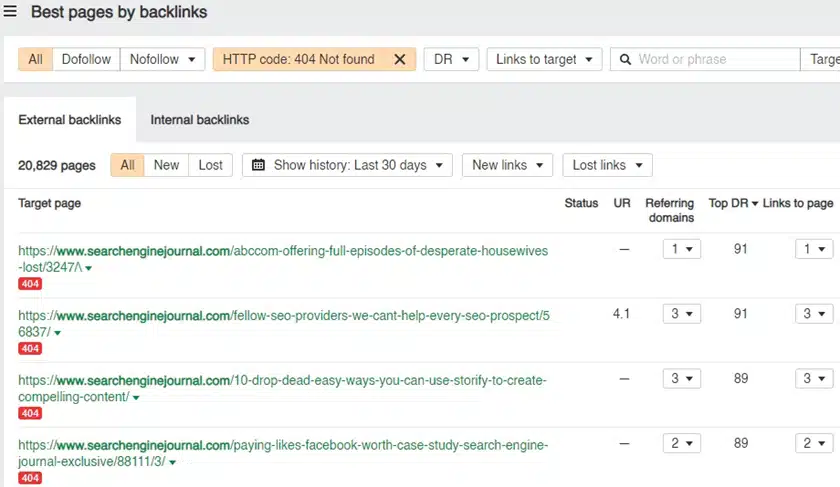
Once you have the data, the next step is picking which links make sense to write a blog post about. Note the referring domains column, which lists the websites with the broken link, and the top DR column, which identifies the referring domain with the highest DR.
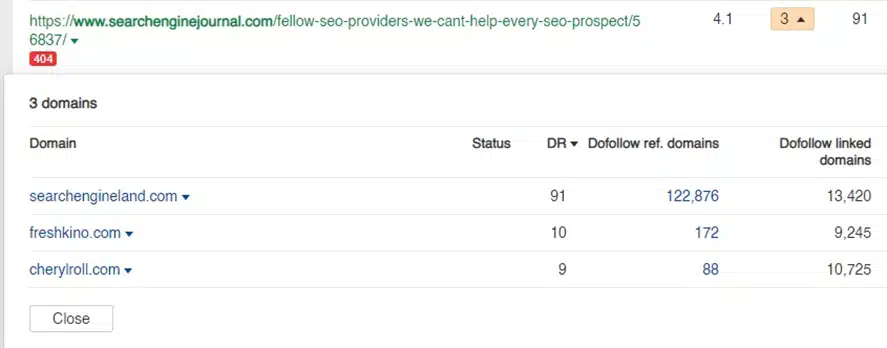
Most humans can be highly competitive. Standing out is so essential that they prefer making a five-figure salary that’s twice the average in one world to a six-figure salary that’s half the average in another. It’s a hardwired trait, regardless of how competitive a person can be.
That said, competition is fair game in the online space. Think about it: Search engines must select the best content pages out of billions on the Web, and the rankings don’t last forever. As soon as a new piece of content starts gaining steam, it’ll only be a matter of time before it supersedes the current rankings.
That’s the Skyscraper Method in a nutshell: Create a piece of content that’s better than what’s already making rounds and promote it to the right audience. When done right, a business can enjoy increases in multiple metrics, including organic traffic and backlinks.
Getting a reporter’s attention is another acceptable alternative to guest posting, albeit more ambitious. They’re always on the hunt for a scoop, regardless of their beat. Offering content that helps with their reports can net your brand on a website with an exceptionally high DR.
However, we say ‘more ambitious’ because it’s in a reporter’s nature to be more meticulous about the things they write. They can be pickier about the information than most publishers, plus their editors can be much more selective.
Today, platforms like Help A Reporter Out connect journalists and sources, but SEO experts iterate that the relationship works both ways. It doesn’t end with just one instance of helping a reporter; it requires continuing to help them for as long as possible. The more you produce quality content for them, the more backlinks you’ll receive.
Conclusion
No one ever said content creation would be easy or produce quick results. Whether its guest posting or any of the alternatives we’ve discussed, time and dedication to quality are required. With enough investment in these two resources, your brand will go places.
On a related note, one alternative worth trying is publishing editorial links. Head to our editorial links page to learn more about how it can work for your business.
Subscribe to Our Blog
Stay up to date with the latest marketing, sales, service tips and news.
Sign Up
"*" indicates required fields


